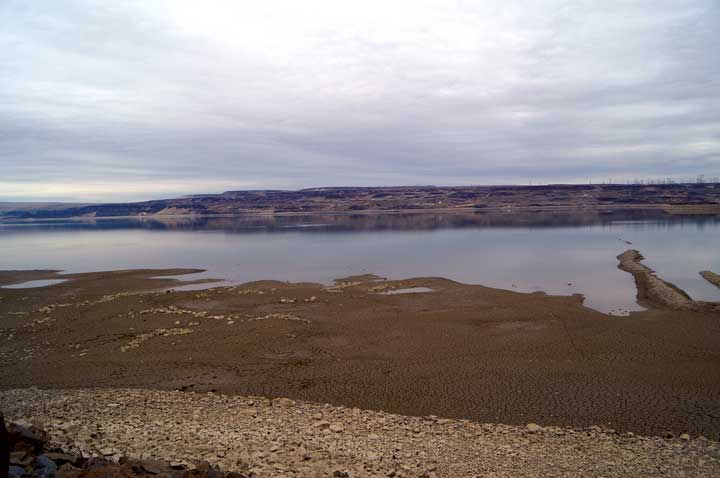New bill passes Legislature

Wanapum Reservoir
Lowered water levels on the Wanapum Reservoir have brought about issues with public safety and preservation of archaeological sites. A bill recently signed into law protects the archaeological locations from being revealed in public records requests.
By Leilani Leach, Columbia Basin Herald staff writer
March 21, 2014
OLYMPIA – A bill protecting the locations of tribal burial grounds and other archaeological sites awaits the governor’s signature to become law.
The legislation, which makes information about the locations of archaeological resources unavailable to the public through public records requests, was passed unanimously by the House with 47 votes in favor and two opposed in the Senate.
In Grant County, some shores of the Columbia River in Grant County PUD’s Priest Rapids Project contain artifacts from the Wanapum and other Native American groups that lived and traveled along the river, according to Grant’s website. And lately, artifact protection and public safety have been concerns because of the lowered Wanapum Reservoir, exposing shoreline and resulting in the PUD closing the area to the public. Two human skeletons, believed to be several years old, were recently found after the water was lowered.
“This bill is about respect for our Indian tribes,” main sponsor Rep. Lillian Ortiz-Self, D-Mukilteo, said, speaking before the Senate Committee on Government Operations.
Tribes are reluctant to share sensitive information about where their ancestors might be buried or artifacts could be found. They’re worried about “people who might go digging around,” said Sen. Pam Roach, speaking in favor of the bill before the senate vote earlier this month.
“This bill is to help protect that by making the whereabouts of such objects a little more shielded,” Roach said.
The supporters of HB 2724 hope it will encourage tribes to entrust local governments with more information so they can prevent sites from being accidentally disturbed during development.
Representatives from the Confederated Tribes of the Umatilla Reservation, state Department of Ecology, Yakama Nation, Association of Washington Cities, state Department of Archeology and Historic Preservation, and state Department of Natural Resources testified in support of the bill.
Rowland Thompson, of Allied Daily Newspapers of Washington, testified with concerns because the bill was drafted too broadly, as it mentions any information and any agency, according to the House Bill Report. “Any agency” should include schools, libraries and museums, Thompson clarified.
He said it could apply to museums or schools, rather than specifically protecting the database of archaeological sites that city developers used.
The bill was amended so property owners can get information about their own property from the state Department of Archaeology and Historic Preservation (DAHP).
“Perhaps they have some cultural data on their property and they may not know about it, and this allows that to happen,” said Sen. Linda Parlette, R-Wenatchee, who proposed the change.
DAHP preservation officer Allyson Brooks said it was important for landowners to know that the department wouldn’t stop construction because of archaeological finds.
“I think it’s a bit of a myth, a scare, that things will stop, when we all work very hard to keep projects going. A lot of times tribes will come out and do the work for free with property owners,” Brooks said at the senate hearing.
Lawmakers also clarified that the bill relates to information regarding the locations of historical resources shared between tribal governments, state agencies or local governments.
Once signed by Gov. Jay Inslee, the law would go into effect in June.
